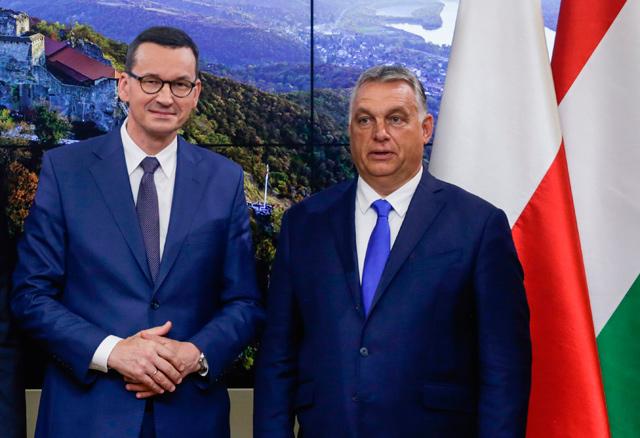- International News
- Thu-2020-10-01 | 03:45 pm

The European Union criticised Hungary and Poland in its first report on democratic standards across the bloc on Wednesday, as tensions soar between Brussels and Budapest.
The report on the "rule of law" in all 27 EU countries comes a day after the bloc rejected hardline Hungarian Prime Minister Viktor Orban's demand that a senior official resign over criticism of his government.
The assessment prepared by the European Commission, the bloc's executive, voices "serious concern" about judicial independence in both Hungary and Poland.
Budapest and its ally in Warsaw have long been at loggerheads with Brussels over issues like civil freedoms and immigration, with Orban accused of persecuting opposition media and forcing the closure of foreign-owned universities.
On Tuesday, Orban demanded the resignation of Vera Jourova, a commission vice president responsible for defending EU values and transparency, for calling Hungary an "ill democracy" in an interview.
The commission rejected the call but the row with Budapest sets the stage for a difficult summit of EU leaders on Thursday, where the rule of law debate looks set to poison attempts to fine tune a major coronavirus recovery package.
Asked about Orban's criticism in an interview with AFP, Jourova refused to be drawn into "personal attacks".
"But I want to reject strongly one thing: I never offended the Hungarian people," she said, insisting she respected them and the choices they had made.
"But this does not mean we should not speak, also critically if needed, about actions of governments and elected representatives."
"No-one's actions are above criticism."
The report examines four main pillars of democracy: Justice systems, anti-corruption frameworks, media freedom and other checks and balances.
It lists a series of concerns over judicial independence in Hungary and warns of a lack of action to tackle graft related to top officials.
"Deficient independent control mechanisms and tight interconnections between politics and certain national businesses are conducive to corruption," the report says of Hungary.
Polish legal reforms, a major point of contention between Warsaw and Brussels, "have increased the influence of the executive and legislative powers over the justice system and therefore weakened judicial independence".
The EU has an "Article 7" procedure probing whether Hungary is undermining European legal standards and democratic values.
This could ultimately lead to them losing EU voting rights, though the hurdles for this are high.
Hungarian Justice Minister Judit Varga condemned the EU report as "absurd and false".
"The concept and methodology of the Commission's rule of law report is flawed, its sources are unbalanced and its content is unfounded," she said in a statement.
The rule of law dispute has hampered protracted negotiations about the EU's long-term budget and is likely to spill into this week's summit.
The European Parliament and several member states want to see funding for countries like Hungary tied to respect for democratic legal values.
But Hungary and Poland, accused of a slide into populist authoritarianism, fiercely oppose this and have threatened to veto Europe's coronavirus recovery plan.
Germany's Angela Merkel has been working to negotiate a compromise arrangement to protect EU funds from being misspent, but diplomats warn the debate is "very polarised" and far from settled.
European diplomats representing member states voted to back the German plan on Wednesday and to begin negotiating with parliament, but seven countries opposed it, including Hungary and Poland.













